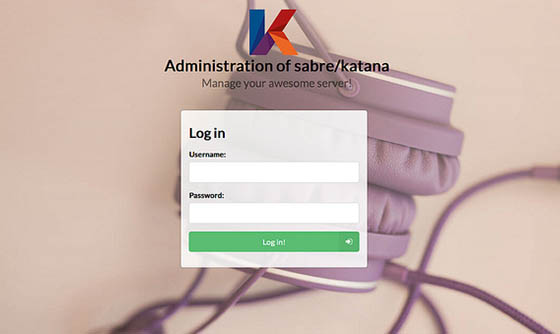
In this tutorial, we will show you how to install and configuration of Sabre/Katana on your CentOS 7. For those of you who didn’t know, Sabre/katana is free and open-source contact, calendar, task list, and file server. Based on world-widely used standards (respectively CardDAV, CalDAV, and WebDAV), sabre/katana will help you to sync your important data between any device, from any location, at any time. sabre/katana is powered by sabre/dav. It is an open-source technology trusted by many leading companies such as ownCloud, Atmail, Box, and fruux. sabre/katana is still under development, and many changes are still applied to the product.
This article assumes you have at least basic knowledge of Linux, know how to use the shell, and most importantly, you host your site on your own VPS. The installation is quite simple. I will show you the step-by-step installation of Sabre/Katana on the CentOS 7 server.
Prerequireds:
- A server running one of the following operating systems: CentOS 7.
- It’s recommended that you use a fresh OS install to prevent any potential issues.
- SSH access to the server (or just open Terminal if you’re on a desktop).
- A
non-root sudo useror access to theroot user. We recommend acting as anon-root sudo user, however, as you can harm your system if you’re not careful when acting as the root.
Install Sabre/Katana on CentOS 7
Step 1. First of all, make sure that all packages are up to date.
yum - update
Step 2. Install the LAMP server.
A CentOS 7 LAMP server is required. If you do not have LAMP installed, you can follow our guide here.
Step 3. Install Sabre/Katana.
Download the latest stable version of Sabre/Katana, At the moment of writing this article it is version 0.3.2:
mkdir /var/www/html/katana wget https://github.com/fruux/sabre-katana/releases/download/0.3.2/katana_v0.3.2.zip unzip katana_v0.3.2.zip -d /var/www/html/katana/
We will need to change some folders permissions:
chown -R apache:apache /var/www/html/katana
Step 4. Configuring MariaDB.
By default, MariaDB is not hardened. You can secure MySQL using the mysql_secure_installation script. you should read and below each step carefully which will set a root password, remove anonymous users, disallow remote root login, and remove the test database and access to secure MariaDB.
mysql_secure_installation
Next, we will need to log in to the MariaDB console and create a database for the Sabre/Katana. Run the following command:
mysql -u root -p
This will prompt you for a password, so enter your MariaDB root password and hit Enter. Once you are logged in to your database server you need to create a database for Sabre/Katana installation:
CREATE DATABASE katana; CREATE USER 'katanauser'@'localhost' IDENTIFIED BY 'PASSWORD'; GRANT ALL PRIVILEGES ON `katana`.* TO 'katanauser'@'localhost'; FLUSH PRIVILEGES;
Step 5. Configuring Apache web server for Sabre/Katana.
Create a new virtual host directive in Apache with the following content:
nano /etc/httpd/conf.d/vhosts.conf IncludeOptional vhosts.d/*.conf
Next, create the virtual host:
###nano /etc/httpd/vhosts.d/yourdomain.com.conf <VirtualHost YOUR_SERVER_IP:80> ServerAdmin webmaster@yourdomain.com DocumentRoot "/var/www/html/katana/" ServerName yourdomain.com ServerAlias www.yourdomain.com ErrorLog "/var/log/httpd/yourdomain.com-error_log" CustomLog "/var/log/httpd/yourdomain.com-access_log" combined <Directory "/var/www/html/katana/"> DirectoryIndex index.html index.php Options FollowSymLinks AllowOverride All Require all granted </Directory> </VirtualHost>
Now, we can restart Apache so that the changes take place:
systemctl restart httpd.service
Step 6. Accessing Sabre/Katana.
Sabre/Katana will be available on HTTP port 80 by default. Open your favorite browser and navigate to http://your-domain.com/public/install.php or http://your-server-ip/public/install.php and complete the required steps to finish the installation. If you are using a firewall, please open port 80 to enable access to the control panel.

Congratulations! You have successfully installed Sabre/Katana. Thanks for using this tutorial for installing Sabre/Katana server on CentOS 7 system. For additional help or useful information, we recommend you check the official Sabre/Katana website.